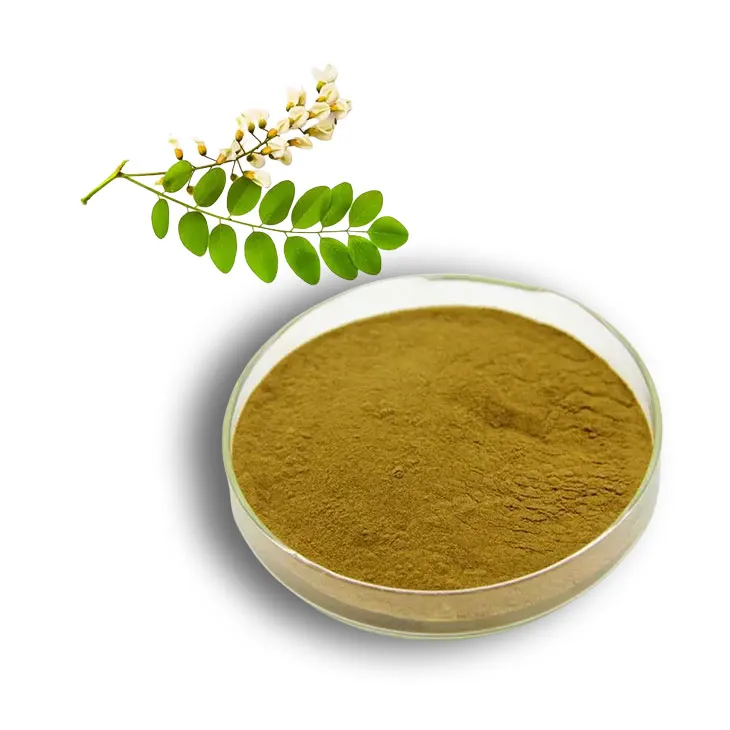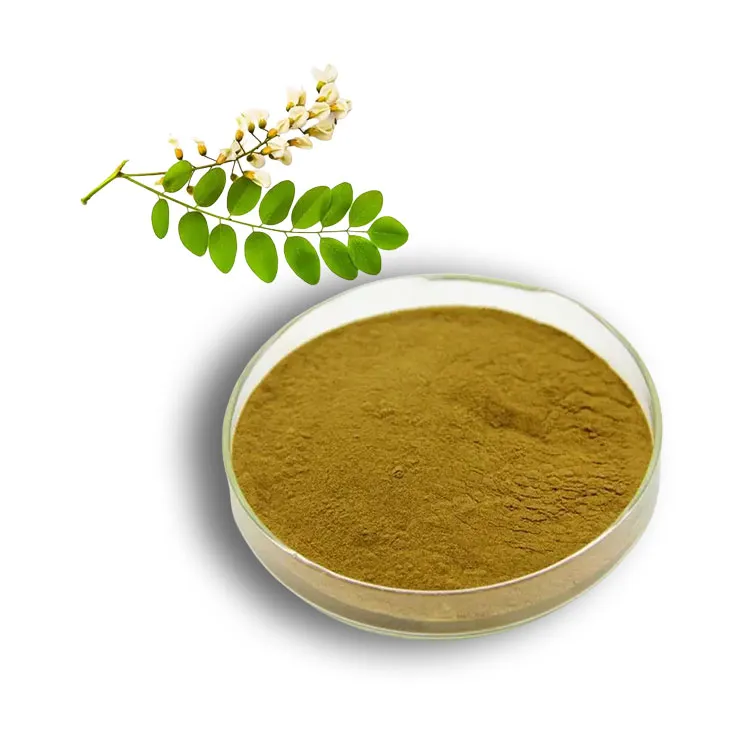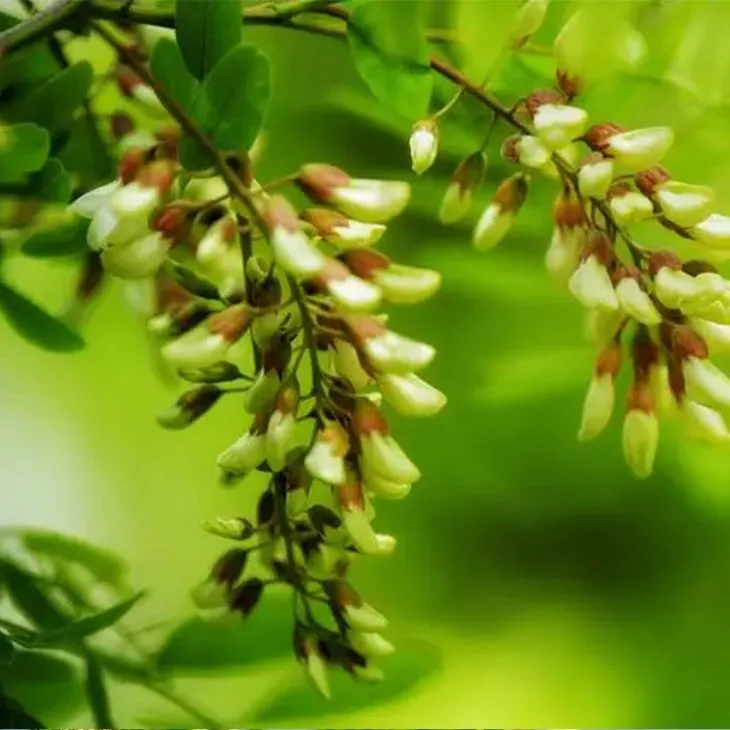- 0086-571-85302990
- sales@greenskybio.com
Best Types of Sophora japonica Flower Extract: A Guide to Selecting the Best Sophora japonica Flower Extract
2024-11-13

1. Introduction to Sophora Japonica Flower Extract
The Sophora japonica flower has been used in traditional medicine for centuries. Sophora Japonica Flower Extract is rich in various bioactive compounds, which endow it with a wide range of potential health benefits and applications. This extract is obtained from the flowers of the Sophora japonica tree, which is native to Asia.

2. Types of Sophora Japonica Flower Extract
2.1. Water - based Extract
- Features: Water - based extraction is a relatively simple and natural method. It mainly extracts water - soluble compounds from the Sophora japonica flower. The resulting extract is often milder in nature. - Benefits: It is suitable for those who may have a more sensitive system. It can retain some of the delicate nutrients and phytochemicals present in the flower. For example, it may contain water - soluble flavonoids which are known for their antioxidant properties. - Applications: Commonly used in the formulation of some herbal teas or mild topical products. For example, in some skin - care products designed for sensitive skin, the water - based Sophora japonica flower extract can provide gentle soothing and antioxidant effects.
2.2. Ethanol - based Extract
- Features: Ethanol is a more effective solvent for extracting a broader range of compounds from the Sophora japonica flower. It can dissolve both polar and non - polar substances, resulting in an extract that is more concentrated in terms of bioactive components. - Benefits: The ethanol - based extract often has a higher content of active ingredients such as certain flavonoids and phenolic compounds. These compounds are associated with strong antioxidant, anti - inflammatory and antimicrobial activities. For instance, some flavonoids in the ethanol - based extract may help in reducing oxidative stress in the body. - Applications: Widely used in the pharmaceutical and nutraceutical industries. It can be used as an ingredient in dietary supplements for promoting health, or in some pharmaceutical preparations for treating certain inflammatory conditions.
2.3. Supercritical CO₂ Extract
- Features: Supercritical CO₂ extraction is a more advanced and environmentally friendly method. It operates at specific temperature and pressure conditions where CO₂ behaves as a supercritical fluid. This allows for very precise extraction of target compounds while leaving behind unwanted substances. - Benefits: The resulting extract is of high purity and quality. It can preserve the integrity of heat - sensitive compounds. For example, some volatile oils present in the Sophora japonica flower can be effectively extracted without being degraded. Moreover, it is free from solvent residues, which is a major advantage in applications where purity is crucial, such as in high - end cosmetics. - Applications: Used in high - quality cosmetics, as well as in some specialized health products. In cosmetics, it can provide anti - aging, skin - brightening and moisturizing effects. In health products, it may be used to target specific health conditions due to its pure and potent nature.

3. Unique Features of Sophora japonica Flower Extract
- Rich in Flavonoids: Flavonoids are one of the main bioactive components in Sophora japonica flower extract. These include rutin, Quercetin and kaempferol. Flavonoids play important roles in antioxidant activity, helping to neutralize free radicals in the body. They also contribute to anti - inflammatory processes and may have potential anti - cancer properties. - Phenolic Compounds: Another group of important substances in the extract are phenolic compounds. These compounds are also involved in antioxidant and anti - inflammatory actions. They can help protect cells from damage caused by oxidative stress and inflammation. - Volatile Oils: The extract may contain volatile oils which are responsible for its characteristic aroma. These oils may also have certain biological activities, such as antibacterial and antifungal effects.

4. Benefits of Sophora japonica Flower Extract
4.1. Health - related Benefits
- Antioxidant Activity: As mentioned before, the flavonoids and phenolic compounds in the extract are powerful antioxidants. This helps in reducing the risk of chronic diseases such as heart disease, cancer and neurodegenerative diseases. By scavenging free radicals, they protect cells and tissues from oxidative damage. - Anti - inflammatory Effects: The extract can help reduce inflammation in the body. This is beneficial for conditions such as arthritis, where inflammation of the joints can cause pain and reduced mobility. It may also be helpful in inflammatory skin conditions like eczema and psoriasis. - Antimicrobial Properties: The volatile oils and some of the phenolic compounds in the Sophora japonica flower extract have antimicrobial effects. This means they can help fight against bacteria, fungi and viruses. For example, they may be useful in preventing or treating infections.
4.2. Cosmetic - related Benefits
- Skin - brightening: The extract can inhibit the production of melanin, which is responsible for skin pigmentation. This leads to a brighter and more even skin tone. - Anti - aging: The antioxidant and anti - inflammatory properties of the extract contribute to anti - aging effects. It can help reduce the appearance of wrinkles, fine lines and sagging skin by protecting the skin from oxidative stress and inflammation. - Moisturizing: Some components in the extract can help improve the skin's moisture - retaining ability, leaving the skin hydrated and supple.
5. Applications of Sophora japonica Flower Extract
5.1. In the Pharmaceutical Industry
- Drug Development: The bioactive compounds in the Sophora japonica flower extract can be studied and developed into new drugs. For example, its anti - inflammatory and antioxidant properties may be exploited in the development of drugs for treating chronic inflammatory diseases or oxidative stress - related disorders. - Traditional Medicine Integration: In traditional medicine systems, Sophora japonica has been used for various ailments. The extract can be further investigated and integrated into modern medicine, perhaps as complementary or alternative therapies.
5.2. In the Nutraceutical Industry
- Dietary Supplements: The extract can be formulated into dietary supplements. These supplements can be used to provide additional antioxidant, anti - inflammatory and antimicrobial support to the body. For example, a supplement containing Sophora japonica flower extract may be beneficial for those with a weakened immune system. - Functional Foods: It can also be incorporated into functional foods. For instance, it could be added to certain health bars or beverages to enhance their nutritional value and health - promoting properties.
5.3. In the Cosmetic Industry
- Skincare Products: As mentioned earlier, the extract is used in a wide variety of skincare products. It can be found in creams, lotions, serums and masks. For example, a face cream with Sophora japonica flower extract may be marketed for its anti - aging and skin - brightening effects. - Haircare Products: Some haircare products also utilize the extract. It may help in promoting healthy hair growth, reducing dandruff and improving the overall condition of the hair.
6. Factors to Consider When Selecting the Best Sophora japonica Flower Extract
6.1. Extraction Method
- Different extraction methods result in extracts with different characteristics. For water - based extracts, they are milder but may have a lower concentration of certain active ingredients compared to ethanol - based or supercritical CO₂ extracts. Ethanol - based extracts are more potent in terms of active ingredient content but may not be suitable for all applications due to the presence of ethanol. Supercritical CO₂ extracts are of high quality and purity but are often more expensive. - When choosing an extract, it is important to consider the intended application. For example, if it is for a sensitive - skin - targeted skincare product, a water - based extract may be more appropriate. However, if it is for a high - potency dietary supplement, an ethanol - based or supercritical CO₂ extract may be a better choice.
6.2. Quality Control
- Raw Material Quality: The quality of the Sophora japonica flowers used for extraction is crucial. High - quality flowers should be sourced, free from contaminants such as pesticides, heavy metals and microbial contaminants. - Manufacturing Standards: The manufacturing process should adhere to strict quality control standards. This includes proper extraction procedures, purification processes and packaging to ensure the stability and quality of the extract. For example, the extract should be packaged in a way that protects it from light, heat and moisture, which can degrade its quality. - Testing and Certification: Reputable manufacturers will conduct regular testing of their extracts. This may include tests for active ingredient content, purity, and safety. Look for extracts that have been certified by relevant regulatory bodies or industry - recognized third - party organizations.
6.3. Active Ingredient Content
- The content of active ingredients such as flavonoids and phenolic compounds is an important factor. Higher content of these compounds generally indicates a more potent extract. However, it is also important to ensure that the extract is balanced and contains all the relevant bioactive components in appropriate proportions. - Manufacturers should provide information about the active ingredient content. This can help consumers and industries make informed decisions when choosing an extract. For example, a skincare product manufacturer may look for an extract with a high content of skin - beneficial flavonoids for formulating an anti - aging product.
7. Conclusion
Sophora japonica flower extract is a valuable natural product with a wide range of potential benefits and applications. By understanding the different types of extracts, their unique features, benefits and applications, as well as the factors to consider when selecting the best extract, we can make more informed decisions in various industries such as pharmaceuticals, nutraceuticals and cosmetics. Whether it is for promoting health, treating diseases or enhancing beauty, the right Sophora japonica flower extract can play an important role.
FAQ:
What are the main active ingredients in Sophora japonica flower extract?
The main active ingredients in Sophora japonica flower extract include flavonoids, such as rutin. These flavonoids are known for their antioxidant properties, which can help protect cells from damage caused by free radicals. Additionally, there may be other bioactive compounds that contribute to its various potential health benefits.
How does the extraction method affect the quality of Sophora japonica flower extract?
Different extraction methods can have a significant impact on the quality of the extract. For example, solvent extraction methods need to carefully select the appropriate solvent to ensure that the active ingredients are effectively extracted while minimizing the extraction of unwanted substances. Supercritical fluid extraction may offer advantages in terms of purity and the preservation of bioactive components. The extraction method can also influence the yield of active ingredients, which in turn affects the overall quality and effectiveness of the extract.
What are the potential health benefits of Sophora japonica flower extract?
Sophora japonica flower extract may have several potential health benefits. Due to its antioxidant properties from flavonoids, it may contribute to cardiovascular health by reducing oxidative stress in blood vessels. It may also have anti - inflammatory effects, which could be beneficial for various inflammatory conditions. Some studies suggest that it may have potential in blood sugar regulation and improving liver function, although more research is needed to fully confirm these effects.
How can one determine the quality of Sophora japonica flower extract?
Quality determination of Sophora japonica flower extract can be done through several factors. Firstly, analyzing the content of active ingredients, such as flavonoids, through reliable laboratory methods like HPLC (High - Performance Liquid Chromatography). Secondly, looking at the purity of the extract, which should be free from contaminants and impurities. Thirdly, the source of the Sophora japonica flowers and the extraction process should be traceable and follow good manufacturing practices. Additionally, quality certifications from recognized authorities can also be an indication of a high - quality extract.
What are the different applications of Sophora japonica flower extract in the cosmetic industry?
In the cosmetic industry, Sophora japonica flower extract has various applications. Its antioxidant properties make it a valuable ingredient in anti - aging products, as it can help prevent skin damage caused by free radicals. It may also have anti - inflammatory properties, which can be useful for soothing irritated skin. The extract can be incorporated into creams, lotions, and serums to improve skin tone, texture, and overall appearance.
Related literature
- Studies on the Active Ingredients of Sophora japonica Flower Extract"
- "The Extraction and Quality Control of Sophora japonica Flower Extract"
- "Health - Promoting Effects of Sophora japonica Flower Extract: A Review"
- ▶ Hesperidin
- ▶ Citrus Bioflavonoids
- ▶ Plant Extract
- ▶ lycopene
- ▶ Diosmin
- ▶ Grape seed extract
- ▶ Sea buckthorn Juice Powder
- ▶ Fruit Juice Powder
- ▶ Hops Extract
- ▶ Artichoke Extract
- ▶ Mushroom extract
- ▶ Astaxanthin
- ▶ Green Tea Extract
- ▶ Curcumin
- ▶ Horse Chestnut Extract
- ▶ Other Product
- ▶ Boswellia Serrata Extract
- ▶ Resveratrol
- ▶ Marigold Extract
- ▶ Grape Leaf Extract
- ▶ New Product
- ▶ Aminolevulinic acid
- ▶ Cranberry Extract
- ▶ Red Yeast Rice
- ▶ Red Wine Extract
-
Quercetin
2024-11-13
-
melatonin extract
2024-11-13
-
Thunder God Vine Extract
2024-11-13
-
Motherwort Extract
2024-11-13
-
Fenugreek Extract Powder
2024-11-13
-
Hawthorn Extract
2024-11-13
-
Agaricus Blazei Extract
2024-11-13
-
Konjac Powder
2024-11-13
-
Bayberry Extract
2024-11-13
-
Lycopene
2024-11-13





















